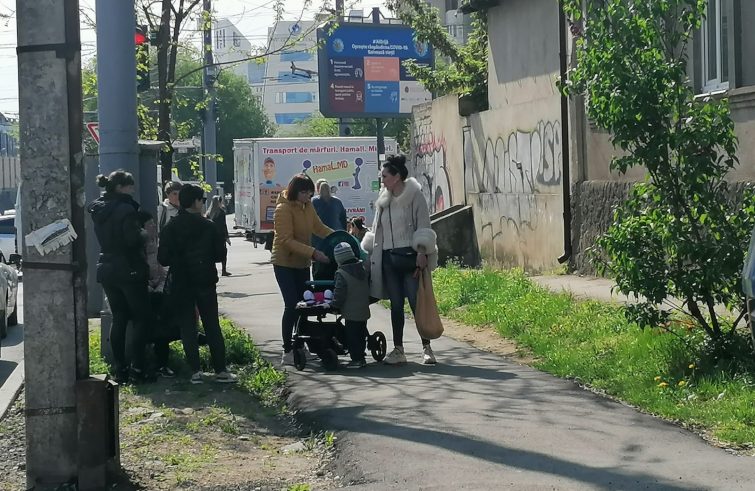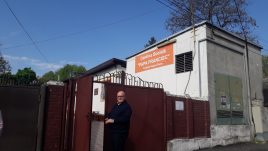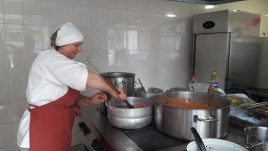
 (From Chișinău) In the city, life flows quietly. After the Easter holiday break, the streets in Chișinău are back to being busy as usual at rush hour. But the uncertainty about the future hangs heavy and is worrying. People look to Odessa, in southern Ukraine, and hope for Mykolaïv’s resilience. As a sign of the growing tension in the self-proclaimed republic of Transnistria, the defense forces of the Odessa region have strengthened border security with Moldova. All this is being played out over a narrow strip of just a few kilometers of the region’s geographical chessboard. Here in Chișinău one struggles to talk. The feeling is that everyone knows that Moldova is now part of the conflict and the presence of Russian troops in Transnistria is a danger to Ukraine, but also to Chișinău. The fact that “anything is possible” does not mean that there is an open path for the Russians, nor that the Moldovans are at a dead end. It means that questions about their own future remain open. “There is a climate of uncertainty and fear, of not knowing what will happen next,” explains Msgr. Cesare Lodeserto, vicar general of the Diocese of Chișinău. “Even before the fear of bombings, there is fear for oneself and one’s own circumstances. Rich people are afraid, but the poor are also afraid.” In short, Moldova is not seeing any bombings for now, but is aware that something is changing, that the situation is evolving rapidly and the outcome could overwhelm, perhaps forever, the democratic history of this country. Predictions are hard to make. The recent statements by the Russian general on the formation of a corridor from Crimea to Transnistria are having an inevitable backlash – only psychological so far – on the population. Chișinău is moving with utmost caution along this delicate ridge. President Maia Sandu has reiterated – and has also done so in recent days when speaking to the Russian ambassador – that Moldova is a neutral country and intends to remain committed to the choice of neutrality. It is clear, however, that “the problem” of Transnistria remains “the great unknown” and the news about the “terrorist alert” in Tiraspol after the explosions of the last few days and the closure of the checkpoints along “the border” do not bode well.
(From Chișinău) In the city, life flows quietly. After the Easter holiday break, the streets in Chișinău are back to being busy as usual at rush hour. But the uncertainty about the future hangs heavy and is worrying. People look to Odessa, in southern Ukraine, and hope for Mykolaïv’s resilience. As a sign of the growing tension in the self-proclaimed republic of Transnistria, the defense forces of the Odessa region have strengthened border security with Moldova. All this is being played out over a narrow strip of just a few kilometers of the region’s geographical chessboard. Here in Chișinău one struggles to talk. The feeling is that everyone knows that Moldova is now part of the conflict and the presence of Russian troops in Transnistria is a danger to Ukraine, but also to Chișinău. The fact that “anything is possible” does not mean that there is an open path for the Russians, nor that the Moldovans are at a dead end. It means that questions about their own future remain open. “There is a climate of uncertainty and fear, of not knowing what will happen next,” explains Msgr. Cesare Lodeserto, vicar general of the Diocese of Chișinău. “Even before the fear of bombings, there is fear for oneself and one’s own circumstances. Rich people are afraid, but the poor are also afraid.” In short, Moldova is not seeing any bombings for now, but is aware that something is changing, that the situation is evolving rapidly and the outcome could overwhelm, perhaps forever, the democratic history of this country. Predictions are hard to make. The recent statements by the Russian general on the formation of a corridor from Crimea to Transnistria are having an inevitable backlash – only psychological so far – on the population. Chișinău is moving with utmost caution along this delicate ridge. President Maia Sandu has reiterated – and has also done so in recent days when speaking to the Russian ambassador – that Moldova is a neutral country and intends to remain committed to the choice of neutrality. It is clear, however, that “the problem” of Transnistria remains “the great unknown” and the news about the “terrorist alert” in Tiraspol after the explosions of the last few days and the closure of the checkpoints along “the border” do not bode well.
“Europe, as always, pays the price of lengthy delays,” sentences Msgr. Lodeserto. ” The situation in the separatist republic has been frozen for 30 years, and in these 30 years the problems have built up and no one has ever had the will to deal with them in the appropriate manner.”
Also on the map are the frozen conflicts in South Ossetia, Abkhazia, Donetsk and Lugansk. Their flags fly, along with the Russian flag, on the main square in Tiraspol. For Europe, addressing these open wounds on the map of the region may mean a battle that will last several years, but it remains the only way forward at this point.
 The other face of the Ukrainian conflict here in Moldova is “hunger”. The president had been saying this from the very beginning, anticipating a difficult period due to the problems in the supply of gas and all the basic necessities that only two months ago were arriving from Russia and Ukraine. The inevitable increase in prices is perhaps the most painful wound that the Ukrainian conflict has inflicted on Moldova so far. 30% of the population lives on the poverty line. Wealth, as always, is concentrated in 10% of the population. The rest is a society made up of state employees and people who live on remittances from emigration. It is a country of caregivers, who represent perhaps the most remarkable component of the gross domestic product. The average salary in the capital is around 300 euros per month. Outside, in the countryside, it is half that. These are low salaries in the face of high and rising prices. The government has been forced to intervene on the gas bills by allowing them to be paid in installments in the hope that this way people will be able to make payments.
The other face of the Ukrainian conflict here in Moldova is “hunger”. The president had been saying this from the very beginning, anticipating a difficult period due to the problems in the supply of gas and all the basic necessities that only two months ago were arriving from Russia and Ukraine. The inevitable increase in prices is perhaps the most painful wound that the Ukrainian conflict has inflicted on Moldova so far. 30% of the population lives on the poverty line. Wealth, as always, is concentrated in 10% of the population. The rest is a society made up of state employees and people who live on remittances from emigration. It is a country of caregivers, who represent perhaps the most remarkable component of the gross domestic product. The average salary in the capital is around 300 euros per month. Outside, in the countryside, it is half that. These are low salaries in the face of high and rising prices. The government has been forced to intervene on the gas bills by allowing them to be paid in installments in the hope that this way people will be able to make payments.
“War is not only an event that destroys a territory,” notes Msgr. Lodeserto. “It is also a tragedy that changes the social life of so many people. It is fear, anguish, concern. We should not wait for the bombs to fall to inform us that we are at war.”
 The charitable action of the Diocese of Chișinău moves along two tracks. On the one hand, there are the Ukrainian refugees (100,000 are those currently present in Moldova); on the other, there are the poor, the every-day poor. Therefore, “a line of parallel sliding of the response to needs” has been taken. “The challenge today – observes Msgr. Lodeserto – is to reconcile the two crises, or we run the risk of seeing very delicate social conflicts and fractures that can turn dangerous. Let’s not forget that many poor people are attached to the Soviet world. People who lived in the Soviet Union, professionals who today are unfortunately reduced to poverty, but remain certainly attached to that world. We need to avoid all of this. Fraternity among the poor is very important for us, to bring everyone on the same track. We cannot create differences among the poor, not by origin, not by nationality, not by religion. But we must know how to lead everyone, each one in the right way and according to his particular situation, on the path of dignity”.
The charitable action of the Diocese of Chișinău moves along two tracks. On the one hand, there are the Ukrainian refugees (100,000 are those currently present in Moldova); on the other, there are the poor, the every-day poor. Therefore, “a line of parallel sliding of the response to needs” has been taken. “The challenge today – observes Msgr. Lodeserto – is to reconcile the two crises, or we run the risk of seeing very delicate social conflicts and fractures that can turn dangerous. Let’s not forget that many poor people are attached to the Soviet world. People who lived in the Soviet Union, professionals who today are unfortunately reduced to poverty, but remain certainly attached to that world. We need to avoid all of this. Fraternity among the poor is very important for us, to bring everyone on the same track. We cannot create differences among the poor, not by origin, not by nationality, not by religion. But we must know how to lead everyone, each one in the right way and according to his particular situation, on the path of dignity”.









